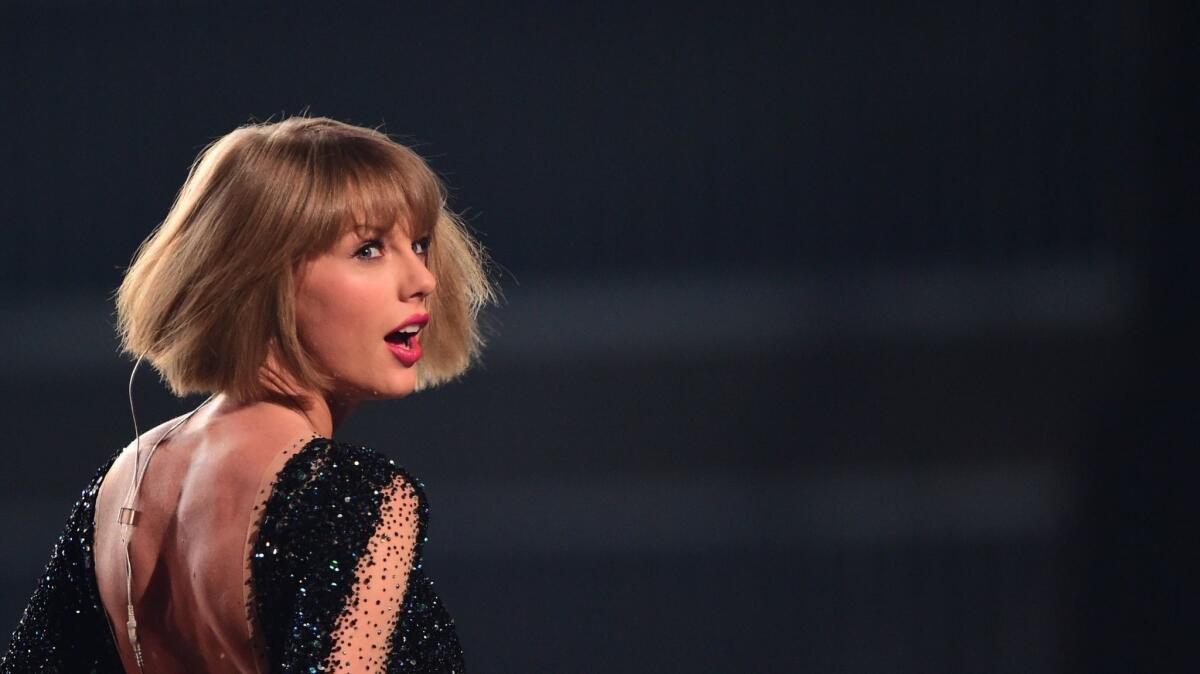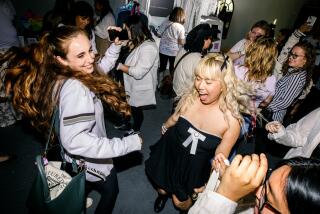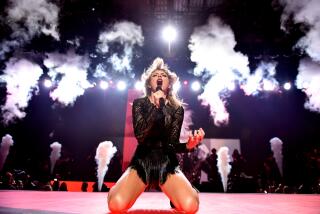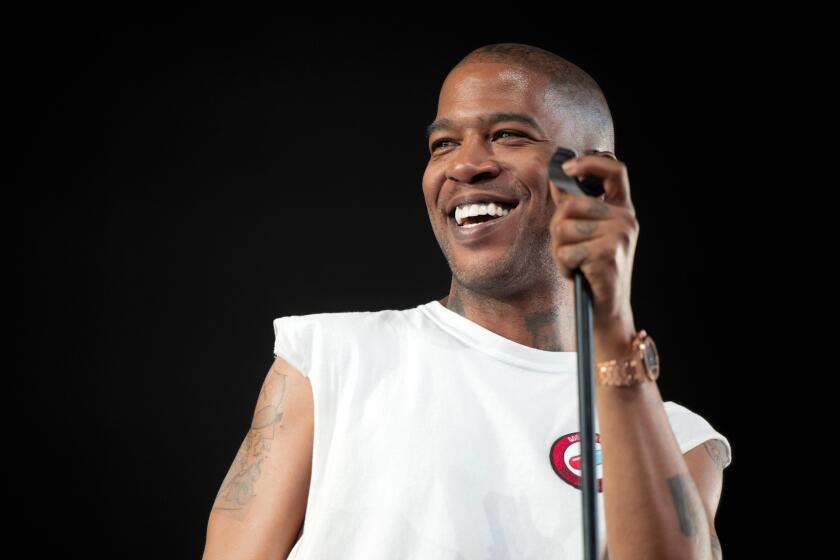Taylor Swift’s Ticketmaster ‘Verified Fan’ initiative sparks controversy

On the surface, pop star Taylor Swift’s ticketing announcement seems simple enough — exciting, even.
“Taylor Swift is committed to getting tickets into the hands of fans … NOT scalpers or bots,” reads the statement on Ticketmaster’s site. “So she’s collaborating with Ticketmaster #VerifiedFan to create an exclusive program to help YOU get the best access to tickets in North America, in a really fun way.”
The blowback on the so-called Verified Fan initiative, though, has been swift and not-always fun, with fans and industry onlookers debating the merits of a relatively new Ticketmaster strategy that aims to recognize Swift’s fans for their devotion — and their willingness to open their wallets.
The program uses a metric called “boost activities” that rewards fans for interacting with the artist’s work, say watching her latest video on YouTube or purchasing her album or merchandise. More boosts will equal a higher place in a virtual line — but not necessarily a guaranteed shot — at buying tickets, and the more money one spends on Swift’s music and products, the better place in line one can secure.
The 10-month old Verified Fan program was used in conjunction with Bruce Springsteen’s impending run of shows on Broadway in New York, but without asking fans to become viral marketers or buy Boss-branded wares. Pop star Harry Styles has also tapped the system.
For Springsteen tickets, fans simply registered with Ticketmaster and the program and hoped they received a text message that deemed them “verified.” Those verified, at the “sole discretion” of Ticketmaster, are then “randomly selected” to receive a code via text message to purchase tickets, according to Ticketmaster emails and fine print explaining the process.
The experiment worked, said David Marcus, the executive vice president and head of music at Ticketmaster: Fewer than 3% of Springsteen available tickets for those shows have ended up on the secondary market, Marcus said.
“For a tour like that and a venue like that, with a limited inventory, it is a massive testament to the Verified Fan engine,” Marcus said. He estimates that before Verified Fan, “more than 50%” of the tickets would have landed on the secondary market.
In Swift’s case, though, those with the supposed best chance of purchasing tickets to her upcoming tour in support of her Nov. 10 album “Reputation” are those who most fully participate in the Swift marketing machinery, often by engaging in social media activities or purchasing items.
Want a so-called “medium boost” in line? Post a photo of a Swift-themed UPS truck to social media, or watch the video for her new song, “Look What You Made Me Do.” And those who desire an upper-tier “high boost” are asked to pre-order Swift’s “Reputation” or buy some Swift merch.
A person familiar with the initiative but not authorized to speak on the record stressed that participating in non-monetary ways throughout the span of the campaign would essentially result in the same amount of boost points.
That strategy is a collaboration between Swift’s team and Ticketmaster, Marcus said, and is designed to tap into the already-established and highly engaged relationship between Swift and her fans.
“They are constantly watching everything she does, consuming it, sharing it, participating in it, arguing with each other, defending her against the haters. It’s the culture of Taylor Swift,” Marcus said.
The challenge was to craft a platform that not only ensured that tickets go to fans and not the scalpers but, Marcus said, to “do it in a way that connects with the fan base the way they expect to be connected, and a way that fuels their passion.”
Dave Brooks, executive editor of the concert-industry trade magazine Amplify, estimated that demand for Swift tickets is at five to 10 times the amount of available seats.
Such an approach is the latest battle in what the ticketing company said is its war against those who resell tickets through secondary ticket sellers such as StubHub, one that has stretched back decades. It comes after earlier innovations proved unable to stem the flow of tickets to scalpers, who employ computer bots to score the best seats.
“What are her options?” Brooks asked. “You could just put [tickets] on sale and they’d get bought immediately by bots and scalpers, and fans would pay the markups and StubHub would make more money than Taylor Swift.”
The trick, however, comes in crafting a promotion that feels fair to fans without potentially leaving them even more disappointed that they didn’t secure tickets had a show just sold out instantly.
For instance, what if after buying all the right merch and playing her videos over and over, a fan still couldn’t get a seat in the venue?
Brooks did acknowledge that Ticketmaster likely doesn’t “want to be sending emails saying ‘Sorry, you did everything right but you’re still not going to get tickets.’”
“We’ll deal with that when we get there,” said Ticketmaster’s Marcus, who stressed that there are “only so many seats in any given building, no matter how big and no matter how many of those buildings she decides to play. The strategy right now is to make sure that we deal with the reality of limited supply — which is the reality in every ticketing situation in the world.”
A spokesperson for Taylor Swift defended the practice.
“If these same tickets were offered on the open market, scalpers would snatch them up and fans would be paying thousands of dollars for them,” reads the statement.
“Scalpers and bots will not take the time to engage in legitimate fan activity,” the statement continues. “Taylor rewarding her fans for posting selfies, watching YouTube videos and downloading her albums, things her fans are already doing, is a great thing. This is a program that rewards fans for being fans and makes sure they get great tickets at face value.”
On Swift’s official Facebook site, some fans took issue with what they perceived was a money-first message. “I love the idea of the verifying fans,” wrote one user. “However you shouldn’t get moved up in line by spending a lot of money. I plan on saving money for tickets and for merch at the concert, I don’t have the money to buy merch right now.”
Christian Hassold, whose site the Ticket Economist explores the politics and economics of the secondary ticketing market, doesn’t believe Swift and Ticketmaster’s pitch will do any damage to her reputation.
“They’ll hone it, they’ll fix it and they’ll make it better,” Hassold said. “The primary way to distribute tickets this way is digital and that’s kind of the way it is. I think, if anything, this is the right direction.”
Ticketmaster acknowledged it may not be perfect, but there may not yet be a perfect solution.
“Does this solve supply and demand? It does not,” Marcus said. “Does it take the price component out of the supply and demand problem? It can, because if I can sell you a ticket that’s worth $1,000, but you’re a big fan and I charge you $100, you’re going to value that.”
Times staff writer Randy Lewis contributed to this report.
For tips, records, snapshots and stories on Los Angeles music culture, follow Randall Roberts on Twitter and Instagram: @liledit. Email: randall.roberts@latimes.com.
Twitter: @augustbrown
More to Read
The biggest entertainment stories
Get our big stories about Hollywood, film, television, music, arts, culture and more right in your inbox as soon as they publish.
You may occasionally receive promotional content from the Los Angeles Times.








